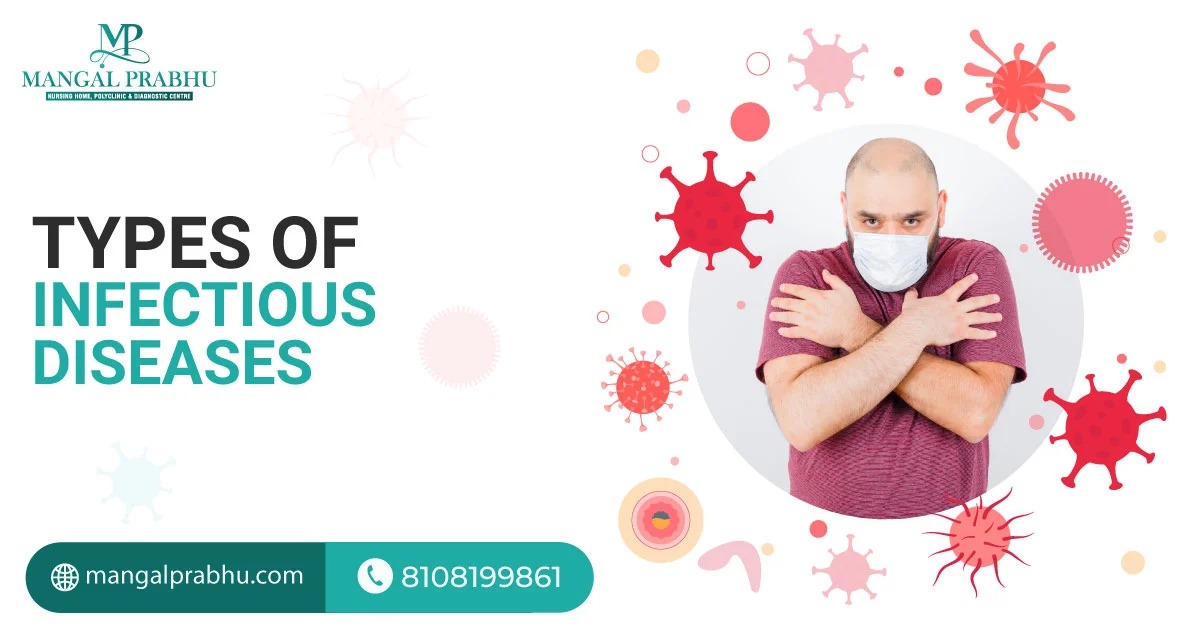
What is Infectious Disease?
Infectious diseases are caused by microorganisms, commonly called pathogens, that enter the human body and multiply. The symptoms, severity, prevention, and treatment of contagious illnesses vary depending on the type of pathogen that infects your body. It can be bacteria, fungal, viral, or parasitic.
The infection usually spreads through bodily fluid exchange, insect bites, skin-to-skin contact, ingesting contaminated liquids or food, and inhaling the contaminated droplets. Whether or not you need infectious disease treatment in Navi Mumbai depends on the type of infectious disease you’ve contracted. Let’s explore the most common ones.
1) Bacterial Infections
Bacteria are found in the human body and the environment. There are trillions of strains of bacteria, some of which are harmless and thrive in our body to fight bad bacteria. Others are, however, harmful enough to cause sickness from releasing toxins. Some severe bacteria-induced illnesses are:
- Strep throat
- Tuberculosis
- Cholera
- Typhoid
- Pneumonia
- Urinary Track Infections (UTIs)
Bacterial infections require antibiotics.
2) Viral Infections
Viruses are not capable of replicating themselves without support. They invade your cells to make multiple copies of themselves. Some viruses cause mild infections, like the common cold and flu. Others can lead to severe and life-threatening illnesses like HPV (that can turn into cancer). They spread from touching contaminated surfaces or if an infected person sneezes or coughs near you. Some common viral illnesses include:
- Common cold
- Coronavirus
- Hepatatits C
- Dengu
- Polio
- HIV
Viral infections do not respond to antibiotics. Fortunately, most mild viral illnesses will disappear with rest, over-the-counter medication, and increased fluid intake. Serious viral infections, like HIV and HPV, may require advanced antiviral treatment.
3) Fungal Infections
Fungal infections usually affect the upper layers of the skin but can go deeper in some cases. Ringworm, athlete’s foot, and candidiasis are the most common fungal infections. Although anyone can develop a fungal infection, people with a weakened immune system are at an increased risk.
If the condition affects your respiratory system, mouth, and other vital organs, you may need to see an infectious disease specialist in Navi Mumbai. Treatment usually involves topical and anti-fungal oral medication, although intravenous administration might sometimes be necessary.
4) Parasitic Infections
Parasites can invade your body and take nutrients from you to thrive. Parasitic infections cause abdominal discomfort, vomiting, diarrhea, and other intestinal symptoms, although they can affect the brain, lungs, and other organs too.
Tapeworm infection, for instance, are the common type of parasitic infection. They enter your body through undercooked meat. They don’t usually produce symptoms, but can cause severe neurological symptoms if they enter the brain. Other examples of parasite-based infections include:
- Malaria
- Toxoplasmosis
- Chagas
- Pinworms
- Cyclosporiasis
Antiparaistics are prescribed to treat parasitic infections. These can be used as standalone treatment or with antibiotics and antifungals.
Conclusion
Some infectious diseases are mild enough to resolve on their own within a few days, while others are severe and might even require hospitalization. To prevent infectious diseases, wash and sanitize your hands frequently, avoid contact with infected people, do not ear raw eggs or meat, and get vaccination.
